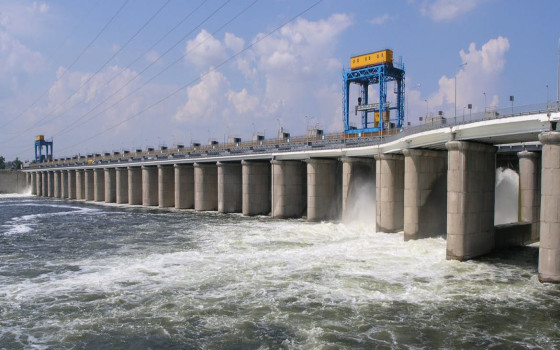
United Nations: The destruction of the Ukrainian Kakhovka Dam is a humanitarian, economic and environmental catastrophe

- Europe and Arabs
- Wednesday , 7 June 2023 13:45 PM GMT
New York: Europe and the Arabs
A UN official said that the United Nations and its partners have expanded their operations to address the effects of the destruction of the Kakhovka Dam in Ukraine, and that an emergency response is now underway to provide urgent assistance to more than 16,000 people.
This came in a briefing given by Martin Griffiths, the United Nations Emergency Relief Coordinator, to members of the UN Security Council at a session held on Tuesday evening in response to the destruction of the dam.
According to the United Nations news bulletin, of which we received a copy on Wednesday morning, Griffiths said that what happened to the Kakhovka Dam may be the largest incident of destruction of civilian infrastructure since the start of the Russian invasion of Ukraine in February 2022.
He added that the scale of the disaster would be fully revealed in the coming days, although it was clear that it would have severe and widespread consequences for people in southern Ukraine on both sides of the front lines, including through the loss of homes, food, safe water and livelihoods.
He said that the suffering of the Ukrainian people would be exacerbated by this incident and added: “It is expected that the immediate humanitarian needs will increase as the flood waters progress in the coming days and as the situation continues to be assessed. The dam is a major source of agricultural irrigation in southern Kherson and Crimea. The continuous floods we have seen On screens today, it will disrupt agriculture, destroy livestock and fisheries, with long-term consequences."
Griffiths described the incident as a massive blow to the already battered food production sector.
He also expressed concern about the risk of mine and explosive device contamination, as torrential waters transported shells into areas once considered safe, exposing people to unpredictable danger.
It is noteworthy that about 30% of the Ukrainian land is contaminated with mines, according to the Ukrainian authorities.
Griffiths made it clear that the United Nations has no access to independent information about the circumstances that led to the destruction of the dam.
But he said international law was very clear that facilities that "contain dangerous forces" such as dams should receive special protection because their destruction could lead to large numbers of civilian casualties.
For his part, the Secretary-General of the United Nations described the destruction of the Kakhovka Dam for hydroelectric power generation in the Kherson region of Ukraine as a major humanitarian, economic and environmental catastrophe. He stressed the need for attacks against civilians and critical civilian infrastructure to stop.
Speaking to reporters at the United Nations headquarters in New York, Antonio Guterres stressed the need to work to ensure accountability and respect for international humanitarian law, calling for a just peace in line with the United Nations Charter, international law and General Assembly resolutions.
Although he stressed that the United Nations could not obtain independent information about the circumstances that led to the destruction of the Kakhovka Dam, he said one thing was clear: "This is another devastating consequence of the Russian invasion of Ukraine."
The Secretary-General said that this incident adds to the threats to the Zaporozhye Nuclear Power Plant - the largest nuclear power plant in Europe - which is highly vulnerable.
He said that the effects of the destruction of the Kakhovka Dam affected the city of Kherson, the town of Nova Kakhovka and 80 other towns and villages along the Dnipro River, where massive floods and large-scale evacuations occurred as well as environmental destruction and damage to newly planted crops.
“At least 16,000 people have already lost their homes – with safe and clean drinking water supplies at risk for thousands more.”
The United Nations and humanitarian partners are rushing to provide support in coordination with the Ukrainian government - including drinking water, water purification tablets and other critical assistance, according to the Secretary-General, who added:
"We will continue our humanitarian work - our calls for safe humanitarian access. Today's tragedy is yet another example of the horrific toll of war on people. The torrents of suffering have been pouring in for over a year. This must stop."












No Comments Found